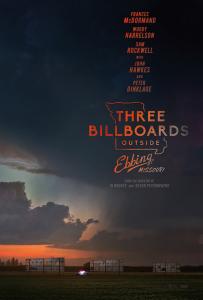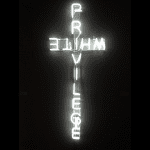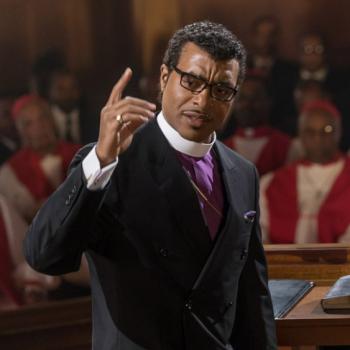Early on in the film Three Billboards Outside Ebbing, Missouri there is a brief shot of a character reading a book. The book, acting like a literary product placement, is Flannery O’Connor’s “A Good Man Is Hard To Find.” O’Connor was a Southern Catholic writer who was known for stories with shocking acts of violence followed by moments of real grace. It was part of O’Connor’s philosophy that to fully understand grace, we must see and feel human depravity.
Martin McDonagh, the writer and director of Three Billboards is clearly a fan of Flannery O’Connor (though I’ve not read an interview where he admits that, at least one other film director, Scott Derrickson, openly admits his own huge admiration for O’Connor). McDonagh’s first feature film, In Bruges, is a gorgeous piece of filmmaking that also has shocking O’Connor-like moments of violence mixed with compelling moments of grace.
“A Good Man Is Hard To Find” is both a fitting subtitle to Three Billboards as well as a key to understanding its story. One of O’Connor’s best-known short stories, “A Good Man” tells the story of  a family traveling on vacation that runs into a group of killers on the loose. The story’s center is the grandmother of the family who is concerned about looking like a “good,” proper lady, but who eventually has a moment of choosing to actually do good in a moment of grace surrounded by brutal violence. One of the killers remarks that she would have been a good woman if “it had been somebody there to shoot her every minute of her life.” This idea of a constant infliction of violence clarifying, and even shaping, a person’s character is echoed in McDonagh’s latest film.
a family traveling on vacation that runs into a group of killers on the loose. The story’s center is the grandmother of the family who is concerned about looking like a “good,” proper lady, but who eventually has a moment of choosing to actually do good in a moment of grace surrounded by brutal violence. One of the killers remarks that she would have been a good woman if “it had been somebody there to shoot her every minute of her life.” This idea of a constant infliction of violence clarifying, and even shaping, a person’s character is echoed in McDonagh’s latest film.
In Three Billboards Outside Ebbing, Missouri, there are no pure heroes or villains. The basic story is of a woman, Mildred Hayes (Frances McDormand), who is trying to find the man who raped and murdered her daughter. She believes that the local police, including Chief Willoughby (Woody Harrelson) and Officer Dixon (Sam Rockwell), are not doing enough to solve the case, which prompts her to put up the billboards referred to in the title in order to exhort the police to keep working the case. As the story progresses, we see that every character has virtues and vices and that the person you think is going to be the protagonist might be one of its villains.
There is some religious symbolism (a steeple in the frame, a sacrificial act of love and justice) but, apart from a confrontation between Mildred and a priest and a conversation Mildred has with a deer, there is little obvious spiritual language apart from characters taking the Lord’s name in vain. Rather, the moments of grace are shown rather than spoken. In fact, talking through the film’s connections in the car afterwards, my wife and I marveled at how almost everyone who was hurt forgave their assailant. There is hard won empathy and kindness shown here.
McDonagh grew up Catholic, and one of Catholicism’s most visually compelling doctrines, so often depicted in Catholic art, is the idea of purgatory, the state in between heaven and hell. Both In Bruges and Three Billboards use purgatory imagery to underline the dramatic weight of their characters’ situations and choices. In the former film, the city of Bruges acts as a geographic purgatory for Ray, Collin Farrell’s morally conflicted hitman (who hates Bruges and just wants to get back to Dublin). Bruges is the place where he will hide out until his boss determines where to send him next or until Ray decides to administer justice to himself. In one of the latter film’s most memorable scenes, Sam Rockwell’s Dixon is caught up reading a letter from his mentor encouraging him to stop hating and to be a better person, which would lead to his achieving his dream of becoming a detective. As he is reading, he is also listening to music in his earbuds and so does not recognize the flames that are growing outside his office, the result of a series of Molotov cocktails Mildred has thrown at the police station. The message is clear, Dixon has to decide whether to be engulfed (damned) by his anger and fear or whether to follow his mentor’s encouragement and example and choose a life of love and self-sacrifice.
Of course, the Bible doesn’t provide for a purgatory-like temporary destination in the afterlife. Still, it does exhort us to “Choose this day whom you will serve” and “Seek the Lord while he may be found.” Our choices in this life do matter for eternity. Good men and women are hard to find, in fact all have sinned and fall short of God’s glory, but God’s grace can intervene in our lives, save us from ourselves, and turn us towards goodness. This is explicit in most of the Bible, although in the book of Esther it is implicit, with God not even being mentioned once in its 10 chapters. Like Esther, McDonagh’s movies offer an implicit understanding of divine grace giving hope to hopelessly angry, violent people.













